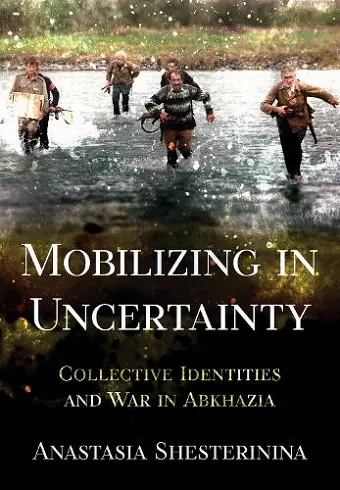Mobilizing in Uncertainty
Collective Identities and War in Abkhazia
Format:Hardback
Publisher:Cornell University Press
Published:15th Mar '21
Should be back in stock very soon
This hardback is available in another edition too:
- Paperback£26.99(9781501778964)

Winner of the Davis Center Book Prize in Political and Social Studies
Co-winner of the Charles Taylor Book Award
How do ordinary people navigate the intense uncertainty of the onset of war? Individuals mobilize in different ways—some flee, some pick up arms, and some support armed actors. Drawing on nearly two hundred in-depth interviews with participants and nonparticipants in the Georgian-Abkhaz war of 1992–1993, Mobilizing in Uncertainty explores Abkhaz mobilization decisions during that conflict.
Anastasia Shesterinina uncovers that to make sense of the violence, Abkhaz leaders, local authority figures, and others relied on shared understandings of the conflict and their roles in it—collective conflict identities—that they had developed before the war. People consolidated mobilization decisions within small groups of family and friends and based their actions on whom they understood to be threatened and mobilized to protect. Their decisions shaped how the Georgian-Abkhaz conflict unfolded. Mobilizing in Uncertainty sheds light on broader processes of violence, which have lasting effects on societies marked by intergroup conflict.
Her interviews led her to important conclusions. This work of oral history is incredibly valuable for any future researcher.
* Choice *The book is a model for theory development, relying on ethnographic research from a little-explored empirical case to develop new questions and theoretical insights. Mobilizing in Uncertainty is certainly a book that leaves the reader inspired.
* Perspectives on Politics *Mobilizing in Uncertainty is an outstanding book: it is theoretically ambitious and empirically rich, and draws on extensive fieldwork, which must have been extremely challenging to conduct. The war began very differently in the east and the west of Abkhazia, in part due to the latter's proximity to Russia, and Shesterinina makes clever use of this subnational variation in her micro-comparative research design. In a field increasingly dominated by quantitative analysis, this book is an excellent and much-needed example of the benefit of rich qualitative data for the study of civil wars. It demonstrates the value of political ethnography and the importance of analysing the micro-dynamics of civil wars
* Ethnopolitics, Symposium Review *Mobilizing in Uncertainty is a terrific book. We need more intrepid, creative, and careful scholars like Shesterinina. Moreover, the implication of her approach to mobilization is most welcome. Individuals involved in conflict are various and enjoy agency. Whatever power is inevitably at play, individuals are not just pawns or dupes or fools. It follows that scholarship about conflict that takes individual testimony seriously, even if not at face value, is a much richer and more compelling one.
* Ethnopolitics, Symposium Review *For teachers of qualitative research methods in simmering conflict zones, Shesterinina represents an exemplar of self-aware, transparent empirical research conduct. Her bravery, conduct, and ethos should inspire political scientists, anthropologists and sociologists. Something is gained when a researcher slows down, listens, and gets to know one's community subjects intimately. As a work of subversive history, Mobilizing in Uncertainty has earned a special place on conflict resolution syllabi. Shesterinina revisits a contested social history in order to place readers in a sympathetic lineage running back through decades of Abkhaz social memory. If this perspective is disorienting to some readers, it just becomes evidence that Shesterinina's book is necessary.
* Ethnopolitics, Symposium Review *Mobilizing in Uncertainty is a model of clear and impactful interpretive social science. Shesterinina gives reason for scholars to take seriously the peculiar and profoundly disorienting nature of uncertainty that colors people's lives at the early onset of conflict.
* Charles Taylor Book Award *Shesterinina's work is theoretically and empirically strong, and we expect that it will be employed by multiple generations of scholars to study other conflicts in the region and beyond.
* The Davis Center Book Prize *Shesterinina's attention to local networks offers significant additional insights into the nature of conflict.
* Caucasus Survey *The author's compelling narrative about this little-studied conflict, told primarily from the Abkhaz perspective, adds considerable nuance regarding how information was communicated and processed by individuals and communities. Mobilization in Uncertainty offers a framework for teasing out such nuances in subjects' reactions and shows how oral history interviews can be put to use to test the assumptions derived from that framework.
* Nationalities Papers *The result is a wonderful book—superbly organized, clearly written, and well argued. The book's methodological design and scholarship are first rate.
* Russian Review *In conclusion, the book effectively conveys the complex transition and shift that occurs during the critical period between the pre-war and war states, shedding light on the intricate dynamics at play during this pivotal time. It is a substantial contribution to war studies, through a sociological lens and it will be of great interest for researchers in post-Soviet but also post-communist conflicts or tensions, more broadly, such as former Yugoslavia and the Baltic countries.
* The Journal of Power Institutions in Post-Soviet Societi- Winner of Davis Center Book Prize in Political and Social Studies 2022 (United States)
- Joint winner of Charles Taylor Book Award 2022 (United States)
ISBN: 9781501753763
Dimensions: 229mm x 152mm x 25mm
Weight: 907g
258 pages